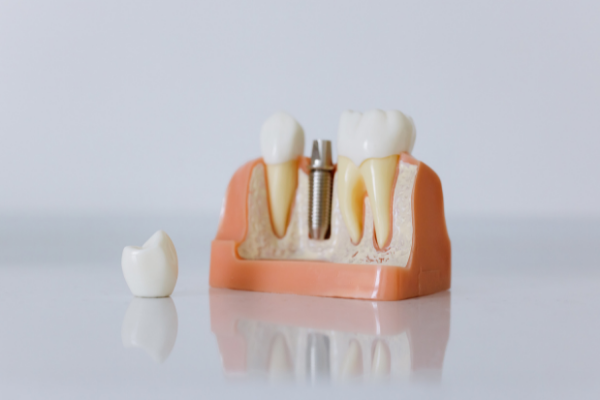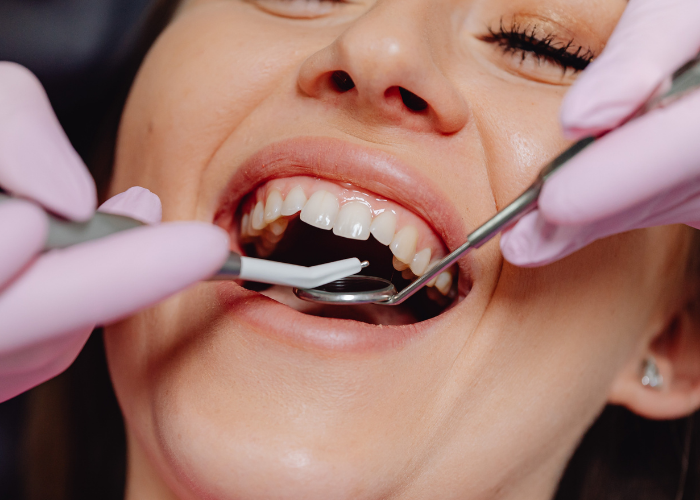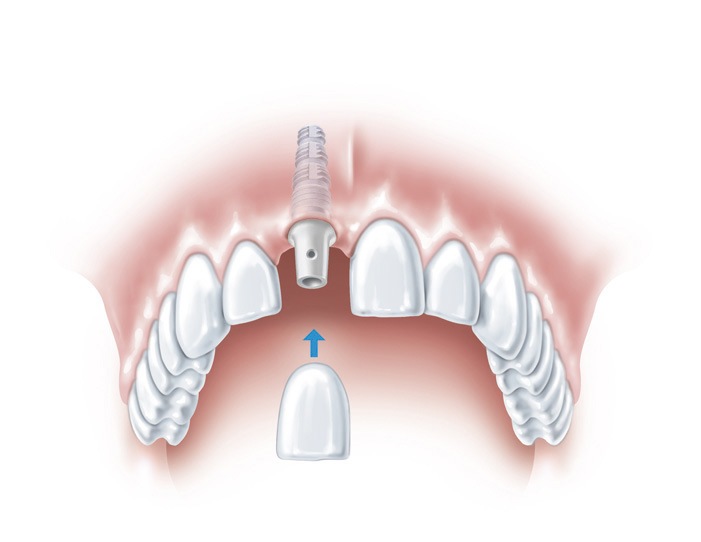Everything You Need to Know About Dental Implants in Scotland
Everything You Need to Know About Dental Implants in Scotland
Dental implants have rapidly grown in popularity when it comes to dental treatment for replacing missing or damaged teeth. In fact, dental implant surgery is now the top choice for Scots when looking to replace a tooth.
The reason dental implants in Scotland have become so popular is primarily due to the natural look that a dental implant provides. In addition, dental implants are durable, long-lasting and the surgery is extremely safe.
Discover the dental implant services offered by The Park Practice in Glasgow, or read below to find out more information about dental implants in Scotland.

How do dental implants work?
Dental implants have two main components to them:
-
The titanium post that acts as the tooth root
-
The cap or crown that is fitted as the replacement tooth
These two parts are fitted to the mouth separately, both needing individual operations split up by a time frame of around 2-3 months.
The teeth implant
The first and most significant operation is fitting the titanium post to the mouth. The titanium post or screw is fitted in the space where the missing tooth previously sat, and penetrates the gum to fuse directly with the jaw bone.
A local anaesthetic will be needed for this operation as it involves significant trauma to the mouth.
After the post has been implanted, your mouth will need time to adjust before any further work can be carried out. During this span of 2-3 months, the implant will gradually fuse directly with the bone, providing a solid and secure base for the replacement tooth.
The replacement tooth
Once your Park Practice implant dentist confirms that the implant has fused with the bone and the mouth has recovered from the operation, a replacement tooth will be fitted to the implant.
This can come in the form of a crown, a bridge or a denture. Crowns are a popular choice as they can be colour matched to fit the exact shade of your natural teeth.
A bridge works by clipping onto the teeth on either side of the implant, whereas dentures will be fitted directly to the titanium post.
The choice will be up to the patient, but your Park Practice dentist will advise on what they see as the best option for your mouth.
Once fitted you’ll be left with a sturdy, natural-looking tooth replacement that will work seamlessly with the rest of your teeth and mouth. You will be able to eat as normal and there will be no outward sign that any dental work has been carried out.
How long do teeth implants last?
Properly cared-for dental implants can last for a lifetime, but this depends on the patients' habits and oral hygiene routine.
The replacement tooth root will last for at least 20-30 years on average. The artificial tooth cap or crown will normally need replacing after just 10 years, however, as it is more susceptible to damage.
There are a number of ways to ensure your dental implants last for as long as possible. These include:
-
Practicing good oral hygiene
-
Brushing twice daily
-
Flossing daily
-
Attending regular check-ups with your dentist
-
Avoiding sugary foods and drinks
-
Avoiding smoking
-
Visiting your dentist immediately upon any signs of loosening or damage to the dental implant.
Can dental implants be replaced?
Yes, dental implants can be replaced. It some occasions they may need to be if the mouth undergoes significant damage or trauma. On rare circumstances the mouth may react negatively or even reject the implant, forcing the dentist to either remove or replace it.
Often, all that will need to be replaced is the replacement tooth part and not the titanium dental implant itself. Crown replacement is common and easily done.
Replacement of the titanium tooth root is a more complicated procedure and will only be done in extreme circumstances, as the implant will have fused directly with the bone and settled firmly into your mouth and jaw.
Are dental implants painful?
Another common question on dental implant treatment is whether they are painful or not. As the initial implant surgery involves drilling in the gum, local anaesthetic will be needed. You will be awake during the surgery but you should feel little to no pain throughout it.
Post-surgery, you may feel heightened sensitivity around the implant area, with some slight discomfort involved. In general, however, this will clear up after just a few days and you will be able to go about your life as normal. Many people return to work the next day after implant surgery.
The crown fitting will be totally pain-free and leave you with a natural-looking tooth, with minimal hassle involved.
Dental implant surgery is extremely safe and common. Our dental implant team has over ten years of experience fitting implants and knows exactly what they are doing when it comes to this procedure.

Dental implant cost Scotland
Now down to the nitty-gritty. What is the average cost of dental implants in the UK?
Well, the answer depends on a few different factors. Private dental clinics set their own prices, meaning the cost for teeth implants will vary depending on your location and on the dental practice you attend.
For dental implants Glasgow, The Park Practice offers a competitive rate, with the average price being £2100 for a single dental implant. The location of the implant and the complexity of the work involved will also have an effect on this price.
You can view The Park Practice price guide to give a better understanding of our dental implant price breakdowns.
Full mouth dental implants
For patients who have lost multiple teeth due to issues such as gum disease, tooth decay or severe trauma, opting for a full mouth dental implant could be a suitable option.
The Park Practice understands the adverse effects that multiple missing teeth can have on a patient. Not only will the ability to eat and speak be impaired, but mental health can be impacted as well.
By choosing a full arch or full mouth dental implant service, patients can fully repair their missing teeth and regain their bite, smile and their confidence. The surgery is significant due to the number of implants needed. Although the full mouth dental implant cost can be expensive, it can be well worth it for patients who are suffering from multiple missing or damaged teeth.
Read our patient testimonials to understand more about the positive effects of dental implants.
What is All-on-4 treatment?
All-on-4 is the most effective way to perform full mouth dental implants without drilling implants into every tooth space.
All-on-4 or All-on-6, depending on individual circumstance, works by having just 4 (or 6) titanium posts secured into the mouth, with the replacement tooth secured on top through crowns and bridges. Just as with a single dental implant, your new teeth will look, feel and appear natural.
Many people see All-on-4 as the most cost-effective and efficient way of replacing a full arch of teeth. You avoid the hassle of using removable dentures and you do not need to undergo surgery that involves 8+ titanium implants.
How much does All-on-4 cost?
As All-on-4 is effectively replacing a full set of teeth, it is a more costly option than just having one or two dental implants. All on 4 is also a very delicate procedure and thus requires a high amount of skill and expertise.
The average cost of All-on-4 is around £12,000.

What are the pros and cons of dental implants?
You might be thinking “are dental implants worth it?” and it’s a good question to ask.
When looking for dental implant procedure in Scotland, it’s important to evaluate both the positive and the negative aspects of undergoing implant surgery.
There are many advantages to teeth implants, but they are not always the best option for everyone. Individual circumstances play a big part and therefore it is important to fully understand the procedure before committing to it.
Main benefits of dental implants
-
Natural-looking replacement for your original teeth
-
Strong, durable and long-lasting
-
Restores confidence in your smile
-
Improves oral health
-
Gives improved feel and comfort to the mouth
-
Safe and effective surgery
Although there are many strong benefits to dental implants, like all surgical operations there are risks and drawbacks.
Main drawbacks of dental implants
-
Not a viable option for everyone – patients with weak or reduced jaw bones will likely not be able to have dental implant surgery
-
Gap in time between initial implant procedure and final completion of the full surgery
-
Can be costly
-
Mouth and gums will take time to heal
-
Patients may need other surgeries before the implant itself can take place (tooth removal, bone graft)
-
Surgery comes with small risks of infection, nerve damage or damage to surrounding teeth
-
Tooth restorations will likely need replaced at some point
-
Risk of implants failing
Medicine.net has a helpful guide on some of the risks the surgery poses and outlines who is not an ideal candidate for dental implants.

Expert dental implant solutions Glasgow
The Park Practice put together this article to help answer all your questions about dental implants. However, if you would like to find out more information on teeth implants, please don’t hesitate to contact our Glasgow clinic.
We’d be more than happy to hear from you and advise you on the best course of action concerning your dental health.
If you’re interested in becoming a registered patient of The Park Practice, you can fill out a patient medical form online.
You can also get in contact with us directly via phone on 0141 334 1211.



